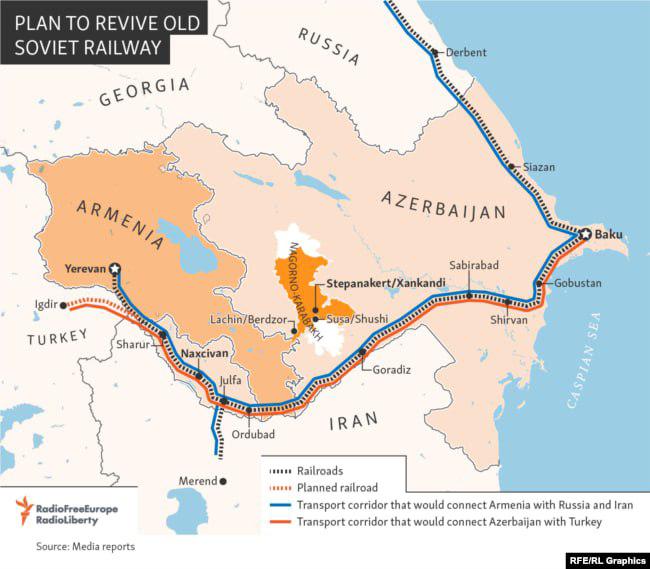Published
10/07/2024, 15:49The Zangezur Corridor has become an important geopolitical issue in the South Caucasus region with complex implications for multiple stakeholders. This proposed transport route would connect the mainland of Azerbaijan with its exclave, the Nakhchivan Autonomous Republic, through the territory of Armenia. The corridor's strategic importance lies in its potential to change regional transport networks and power dynamics. (Chedia, 2024; Coppolecchia, 2024; Gasimli, 2021; Gawliczek & Iskandarov, 2023).
Azerbaijan views the Zangezur corridor as crucial for connecting its mainland to Nakhichevan and strengthening its regional position. For Turkey, the corridor would provide a direct land route to Azerbaijan and possibly the Central Asian Turkic states, expanding its influence in the region (Chedia, 2024; Coppolecchia, 2024; Gasimli, 2021; Gawliczek & Iskandarov, 2023).
Armenia has demonstrated reluctance towards the project, particularly objecting to the term ‘corridor’ and its implications. However, recent developments indicate a possible change in Armenia's position, as Prime Minister Nikol Pashinyan has included the railway component of the project in his ‘Crossroads of Peace’ initiative (Chedia, 2024; Coppolecchia, 2024; Gasimli, 2021; Gawliczek & Iskandarov, 2023).
Iran perceives the Zangezur Corridor as a possible threat to its national security and economic interests. Iranian officials have expressed a generally negative attitude towards a new motorway along the border with Armenia (Chedia, 2024; Coppolecchia, 2024; Gasimli, 2021; Gawliczek & Iskandarov, 2023). The corridor is seen as potentially diminishing Iran's role in regional logistics and reducing its influence on Armenia, which it maintains strategic relations with (Novruz, 2024; Veliyev, 2024).
Russia has demonstrated support for the corridor development, which has led to some tensions with Iran. This divergence of interests between Russia and Iran over the Zangezur corridor has become a point of geopolitical friction (Chedia, 2024); Coppolecchia, 2024; Gasimli, 2021; Gawliczek & Iskandarov, 2023).

The Zangezur corridor could change the balance of power in the South Caucasus, affecting the influence of countries such as Russia, Turkey and Iran. It will establish new transport links, potentially affecting existing routes through countries such as Georgia and Iran.
The project has attracted the world powers' attention, with the EU and the USA also interested in the region's stability and development. The corridor's development is complicated by wider regional conflicts and geopolitical tensions, including the Nagorno-Karabakh conflict impact. (Chedia, 2024; Coppolecchia, 2024; Gasimli, 2021; Gawliczek & Iskandarov, 2023).
The Zangezur Corridor promises economic benefits including revitalisation of trade routes linking Central Asia, the South Caucasus and Europe, expansion of railway networks and a surge in regional and international trade (Gulahmadov & Huseyn, 2023).
The economic benefits of the Zangezur Corridor can be viewed through different prisms, including trade facilitation, energy exchange, and tourism development.
The economic analysis shows that the corridor would most likely lead to increased trade activity between the countries involved, fostering stronger economic ties and cooperation (Gulahmadov & Hajiyeva, 2023). Improving transport links, the corridor is expected to reduce transit time and cost, which are crucial factors in expanding trade flows. Studies have demonstrated that the improved transit infrastructure can significantly boost intra-regional trade, with estimates suggesting increases of up to 50 per cent in certain contexts (Kim, Mariano & Abesamis, 2021). This is particularly relevant for landlocked regions such as Nakhichevan, which will gain improved access to international markets through the Zangezur Corridor.
The Zangezur corridor represents a lower-cost alternative to other projects in the region. It can help establish a better balance between eastbound and westbound rail traffic along the New Silk Road, potentially reducing the cost of rail transport (Gasimli, 2021). The New Silk Road, part of China's One Belt, One Road Initiative (BRI), is a massive infrastructure project to revitalise ancient trade routes connecting Asia to Europe. The construction of the China-Kyrgyzstan-Uzbekistan railway is part of this major "New Silk Road" project. Improving transport networks across Central Asia, the initiative promotes trade, economic integration and interaction between the regions.
Furthermore, the potential of the corridor to improve energy exchange cannot be underestimated. As part of broader regional initiatives, it is expected to facilitate the movement of energy resources, thereby contributing to the energy security of participating countries (Gulahmadov & Hajiyeva, 2023; Gulahmadov & Huseyn, 2023). The corridor's strategic location at the crossroads of East-West and North-South transport routes positions it as a key player in the global logistics network, which is essential for the efficient movement of goods and energy (Gawliczek & Iskandarov, 2023; Fedorovskaya, 2022).
In addition to trade and energy, the Zangezur Corridor promises to develop tourism. Improving access to various destinations is likely to increase the region's attractiveness to tourists, thereby creating additional revenues and economic opportunities (Kaya, Karakuş, & Onat, 2024).
The potential for tourism growth is a particularly important given the rich cultural and historical heritage of the South Caucasus, which could be utilised to attract visitors from around the world.
Moreover, the corridor is expected to play a crucial role in enhancing regional stability and cooperation. Through enhancing economic interdependence between Azerbaijan, Armenia, and Turkey, the Zangezur corridor can contribute to long-term peace and reconciliation efforts in a historically unstable region (Gulahmadov & Hajiyeva, 2023; Gulahmadov & Huseyn, 2023; Həsənova, 2024). The establishment of this corridor may also encourage Armenia to participate more actively in regional initiatives, potentially reducing its dependence on traditional trade routes and promoting a more integrated regional economy (Həsənova, 2024; Ismailzade, & Babayev, 2021).
However, these potential benefits are balanced against geopolitical risks and challenges. Disagreements over the implementation and control of the corridor persist among the parties involved. The term ‘corridor’ itself has become a point of contention, especially for Armenia (Gawliczek & Iskandarov, 2023).
In conclusion, the Zangezur Corridor is a key infrastructure project with the potential to make a significant impact on the economy of the South Caucasus and beyond. Expanding trade, facilitating energy exchange, promoting tourism and strengthening regional cooperation, the corridor is positioned as a transformative force in the region. Its economic potential underlines its importance as a catalyst for growth, integration and stability in a part of the world long characterised by geopolitical tensions.
However, it is worth noting that the Zangezur corridor is also a complex geopolitical issue that intersects with regional power dynamics, economic interests and long-standing conflicts in the South Caucasus. Its development and potential implementation continue to be the subject of intense negotiations and strategic manoeuvring between the countries involved and external powers.
Author: Nargiza Nassymbekova, PhD in Economics


